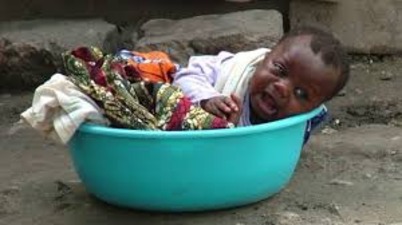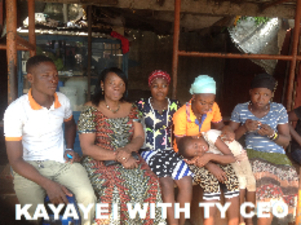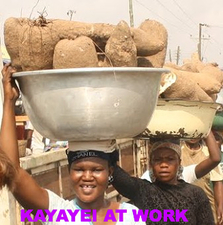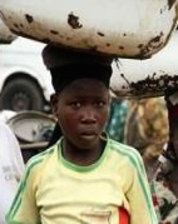SUPPORTING the YOUTH to CREATE JOBS for the YOUTH and REDUCE POVERTY
SAVE THE KAYAYEI
TOTALLY YOUTH

....................................................................BACKGROUND
....................................................................Kayayei – homeless girl porters – have become painful reminders to Ghanaians, that ....................................................................outmoded traditions, customs and poverty cause human tragedies, especially for girls. Kayayei ....................................................................are mostly girls between the ages of 10-24, from the north of Ghana who escape to Accra and ....................................................................other big cities to avoid being forced into early marriage or to look for greener pastures. They ....................................................................are vulnerable and mostly uneducated and clueless about life in the big cities. Majority of them ....................................................................end up as low-paid head porters in the markets of these cities, basically living from hand to ....................................................................mouth.
....................................................................IDENTIFIED PROBLEM
....................................................................Kayayei are mostly from under-served, low-income, poor communities and are victims ...................................................................of outmoded customs, unemployment and human trafficking. Once they arrive in the big cities, ....................................................................they become prey to gangs and ruthless people who exploit them. They are homeless and sleep rough on pavements, in and under kiosks or any place they can lay their heads. Many get raped, beaten up and robbed of their meagre belongings. Some are saddled with unwanted pregnancies and become single parents or undergo unsafe abortions; some become prostitutes. Their children end up becoming Kayayei as well, perpetuating a cycle of illiteracy, homelessness and insecurity.
ENVISAGED SOLUTION
Several Kayayei will be interviewed and tested in domestic skills. Those who pass the entry- level requirements will be registered. They will go through a medical check-up to ensure that they have no communicable diseases and addictions. They will then be registered for health insurance. They will be camped and fed at our premises for the duration of the project. Consideration will also be given to girls from low-income, under-served, poor communities.
120 Kayayei (age 18-24) will be trained annually, in batches of 15 in a 6-week Domestic Assistant course. This will include training in personal hygiene, customer relations, work ethics and money management. They will qualify as professional Domestic Assistants, who can provide a range of paid services including housekeeping, cleaning, cooking, laundry and babysitting.
Domestic Assistants will have specific terms of reference to determine wage levels based on market trends. All alumni will be placed through direct advertising and stringent interviewing of prospective employers (e.g. households and businesses). Placements will be based on contracts that specify the services to be provided and also protect the rights of the girls and ensure their safety. Within the contract, we will monitor their progress (physical and via mobile applications) to ensure that employers are treating them properly and that they (alumni) are meeting their terms of reference. We will place them in the hospitality industry, organizations and homes. Alumni with entrepreneurial skills will be supported to start their own businesses, operating from our Catering, Beauty and Fashion Centres under our incubation programme.
We will embark on continuous advocacy and awareness-raising activities through meetings, social networks, mobile platforms, etc, until the Kayayei trend dies off through government policies and citizen self-awareness. Any profits from the project will go towards building a vocational school in northern Ghana that will use "train-and-employ" and "train-and-incubate" methodologies to offer transitional employment to alumni. This will ensure income earning and building of competencies while alumni are looking for permanent employment.
FUNDING REQUIREMENTS
Totally Youth already has in place the facilities and most of the tools and equipment for the project. We however need GH¢218,600 to cover a number of recurrent costs for one year and a few one-off costs. The breakdown of the additional funding required is as indicated in the table below. The funds will help start and keep the project running for one year.
There is a ready market for professional Domestic Assistants. But even though they are in very high demand, turnover is also very high due to lack of properly trained Domestic Assistants. Potential employers include the hospitality industry, donor community, expatriate community, pensioners and working parents. Consequently, with timely funding, the project will be self-reliant in 2 years, through placement fees. We may even have some employers making advance payments for placements. We therefore have a win-win situation all round – for the girls, employers and the community.
ONE-OFF FUNDING REQUIREMENTS FOR START YEAR
ITEM ESTIMATE GH¢ COMMENT
If the full additional funding of GHc218,600 is obtained, the project can start immediately with the first 15 girls. Timely funding will also help avoid increases in prices that will go beyond the estimated budget. Based on the estimated budget, the projections on implementation are as indicated below:
PROJECTIONS UNDER IDEAL SITUATION
ITEM ESTIMATE GH¢ COMMENT
Consequently, the project will be self-reliant by the second year. All other costs will be borne by Totally Youth under its not-for-profit status. The full financial details are available on request. Tools and appliances include freezer, blender, microwave, electric kettle and toaster. Camping items comprise camp beds, treated mosquito nets and pillows. Items under personal hygiene include tooth paste, detergent, sponge and towels. The main rehabilitation involves re-roofing and cordoning our event space for use as camping space.
Once the project gains ground during its first year, we will embark on sponsorship drives. This will be mainly for in-kind donations for recurrent inputs such as personal hygiene items and clothing. Funds raised will ensure continuity of the project in the scenario when alumni do not get placed immediately and/or placement fees do not get paid on time.
EXPECTED IMPACT
....................................................................Kayayei – homeless girl porters – have become painful reminders to Ghanaians, that ....................................................................outmoded traditions, customs and poverty cause human tragedies, especially for girls. Kayayei ....................................................................are mostly girls between the ages of 10-24, from the north of Ghana who escape to Accra and ....................................................................other big cities to avoid being forced into early marriage or to look for greener pastures. They ....................................................................are vulnerable and mostly uneducated and clueless about life in the big cities. Majority of them ....................................................................end up as low-paid head porters in the markets of these cities, basically living from hand to ....................................................................mouth.
....................................................................IDENTIFIED PROBLEM
....................................................................Kayayei are mostly from under-served, low-income, poor communities and are victims ...................................................................of outmoded customs, unemployment and human trafficking. Once they arrive in the big cities, ....................................................................they become prey to gangs and ruthless people who exploit them. They are homeless and sleep rough on pavements, in and under kiosks or any place they can lay their heads. Many get raped, beaten up and robbed of their meagre belongings. Some are saddled with unwanted pregnancies and become single parents or undergo unsafe abortions; some become prostitutes. Their children end up becoming Kayayei as well, perpetuating a cycle of illiteracy, homelessness and insecurity.
ENVISAGED SOLUTION
Several Kayayei will be interviewed and tested in domestic skills. Those who pass the entry- level requirements will be registered. They will go through a medical check-up to ensure that they have no communicable diseases and addictions. They will then be registered for health insurance. They will be camped and fed at our premises for the duration of the project. Consideration will also be given to girls from low-income, under-served, poor communities.
120 Kayayei (age 18-24) will be trained annually, in batches of 15 in a 6-week Domestic Assistant course. This will include training in personal hygiene, customer relations, work ethics and money management. They will qualify as professional Domestic Assistants, who can provide a range of paid services including housekeeping, cleaning, cooking, laundry and babysitting.
Domestic Assistants will have specific terms of reference to determine wage levels based on market trends. All alumni will be placed through direct advertising and stringent interviewing of prospective employers (e.g. households and businesses). Placements will be based on contracts that specify the services to be provided and also protect the rights of the girls and ensure their safety. Within the contract, we will monitor their progress (physical and via mobile applications) to ensure that employers are treating them properly and that they (alumni) are meeting their terms of reference. We will place them in the hospitality industry, organizations and homes. Alumni with entrepreneurial skills will be supported to start their own businesses, operating from our Catering, Beauty and Fashion Centres under our incubation programme.
We will embark on continuous advocacy and awareness-raising activities through meetings, social networks, mobile platforms, etc, until the Kayayei trend dies off through government policies and citizen self-awareness. Any profits from the project will go towards building a vocational school in northern Ghana that will use "train-and-employ" and "train-and-incubate" methodologies to offer transitional employment to alumni. This will ensure income earning and building of competencies while alumni are looking for permanent employment.
FUNDING REQUIREMENTS
Totally Youth already has in place the facilities and most of the tools and equipment for the project. We however need GH¢218,600 to cover a number of recurrent costs for one year and a few one-off costs. The breakdown of the additional funding required is as indicated in the table below. The funds will help start and keep the project running for one year.
There is a ready market for professional Domestic Assistants. But even though they are in very high demand, turnover is also very high due to lack of properly trained Domestic Assistants. Potential employers include the hospitality industry, donor community, expatriate community, pensioners and working parents. Consequently, with timely funding, the project will be self-reliant in 2 years, through placement fees. We may even have some employers making advance payments for placements. We therefore have a win-win situation all round – for the girls, employers and the community.
ONE-OFF FUNDING REQUIREMENTS FOR START YEAR
ITEM ESTIMATE GH¢ COMMENT
- MEALS 24,000.00 GH¢750 per batch for 8 batches 145,600
- CLOTHING 57,600.00 GH¢120 per person for 120 girls
- PERSONAL HYGIENE 28,800.00 GH¢60 per person for 120 girls
- TRAINING CONSUMABLES 19,200.00 GH¢600 per batch for 8 batches
- TRAINER’S ALLOWANCE 16,000.00 GH¢1,000 per batch for 8 batches
- CAMPING ITEMS 9,000.00 One-off purchase for use by girls
- TOOLS AND APPLIANCES 24,000.00 One-off purchase, for hands-on training
- CAMP SITE REHABILITATION 24,000.00 One-off purchase of materials/labour
If the full additional funding of GHc218,600 is obtained, the project can start immediately with the first 15 girls. Timely funding will also help avoid increases in prices that will go beyond the estimated budget. Based on the estimated budget, the projections on implementation are as indicated below:
PROJECTIONS UNDER IDEAL SITUATION
ITEM ESTIMATE GH¢ COMMENT
- START YEAR BUDGET 218,600.00 Total additional funding required (Grant)
- START YEAR EXPENDITURE 218,600.00 Based on estimated grant budget
- START YEAR REVENUE 60,000.00 GH¢500 per placement for 120 alumni
- AVAILABLE FOR 2ND YEAR 60,000.00 Revenue from 1st year factoring in price increases
- SECOND YEAR EXPENDITURE 177,760.00 10% price increases on recurrent costs
- SECOND YEAR REVENUE 126,000.00 GH¢550 per advanced placement for 120 alumni + Budget
- INCOME OVER EXPENDITURE 37,240.00 2nd Year Budget + Revenue – Expenditure
- AVAILABLE FOR THIRD YEAR GH¢37,240.00 if no donations || GHc37,240.00 + GH¢145,600.00 (with in-kind donations)
Consequently, the project will be self-reliant by the second year. All other costs will be borne by Totally Youth under its not-for-profit status. The full financial details are available on request. Tools and appliances include freezer, blender, microwave, electric kettle and toaster. Camping items comprise camp beds, treated mosquito nets and pillows. Items under personal hygiene include tooth paste, detergent, sponge and towels. The main rehabilitation involves re-roofing and cordoning our event space for use as camping space.
Once the project gains ground during its first year, we will embark on sponsorship drives. This will be mainly for in-kind donations for recurrent inputs such as personal hygiene items and clothing. Funds raised will ensure continuity of the project in the scenario when alumni do not get placed immediately and/or placement fees do not get paid on time.
EXPECTED IMPACT
- Empowered ex-Kayayei who will become Ambassadors and go back to their communities to lead the fight for the eradication of the Kayayei syndrome;
- Ex-Kayayei Ambassadors who will go to the various market places to educate their peers and help them get access to this project and others;
- Reduction in the destitution and rape of Kayayei, due to the awareness-raising component of the project and the success of the alumni;
- Reduction in teenage pregnancies, single-parenthood, prostitution and youth poverty;
- Reduction in youth unemployment and increase in the level of respect for professional Domestic Assistants;
- Improved health, safety, security, sanitation and livelihood, in under-served, low-income communities;
- Empowered ex-Kayayei who will protect their girl-child and give them a better future;
- Enactment/enforcement of policies and laws to end forced marriages and human trafficking, which create the Kayayei syndrome and waste the lives of the girl-child.
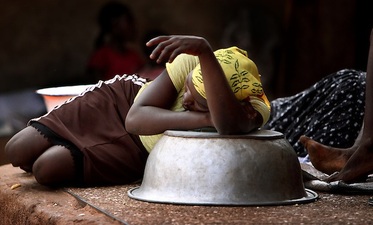
VISITORS:
